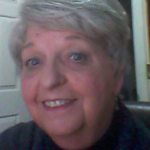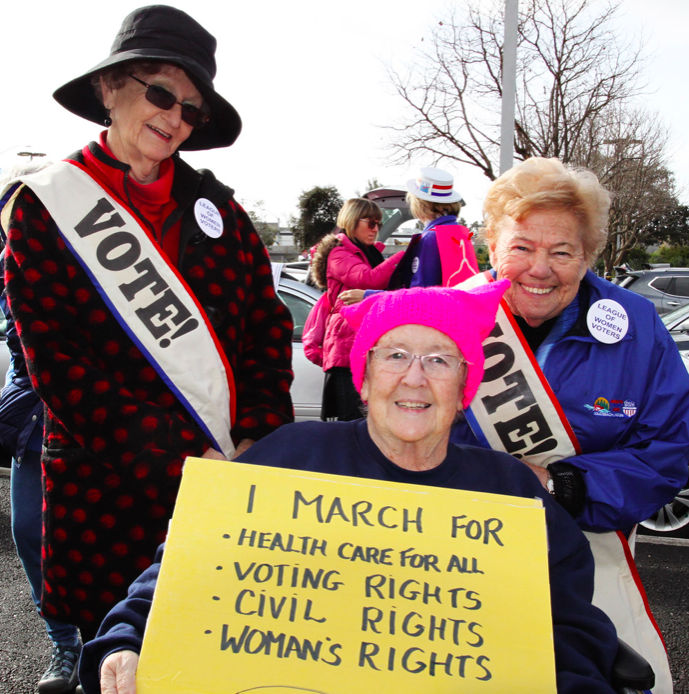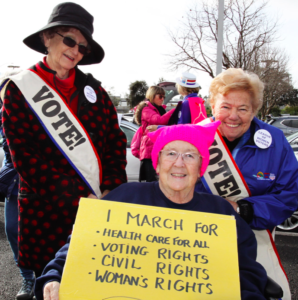I grew up believing women complete their education, find a job and “keep their head down”. For the first half of my life, I guess I did exactly that. As women age and society changes around them, aging often takes on new meaning. After taking early retirement and moving to North Carolina, I began to think about what being an “aging” woman really meant to me. I can sum it up in one word: freedom.
The Cambridge English dictionary defines freedom as “the condition or right of being able or allowed to do, say, think, etc. whatever you want to, without being controlled or limited.” During my working years, I do not believe I felt the freedom to express my views related to social justice. I was aware of what was expected of me and the values and beliefs of the institutions for which I worked. If I wanted to stay employed at a particular organization, I was expected to not say anything or do anything that would reflect poorly on my place of employment. For me, this often meant that my views about social justice issues/concerns were not addressed. It wasn’t until I decided to retire from the work force that I experienced a true sense of freedom to express my personal values related to many of the social justice issues facing those living in North Carolina. Merriam Webster refers to freedom as being a noun and a very powerful word. Freedom is defined as “the state of being free or at liberty rather than in confinement or under physical restraint”; or as an “exemption from external control, interference, regulation, etc.”; or even as “the power to determine action without restraint.”
While living in North Carolina, my sense of becoming a community activist began to grow and for the first time in my adult life, I felt the freedom to act without being told I had to conform to institutional rules and regulations. Therefore, becoming an “aging” woman allowed me the opportunity to actively address areas I had only just thought about in the past. I do not believe any of my actions would be seen as deviant behavior, but rather as an individual not afraid to stand up, make her voice heard, and become a contributing force to the needed change within our state.
The following are examples of actions my ‘freedom’ gave me the courage to do.
Write Letters To The Editor. I had never done this before because I realized that once I had an opinion in print, everyone would know my viewpoint and could hold me accountable. An example is a letter to the editor that was published in the N & O shortly after one of our former Governors offered a plate of cookies to several women who were standing in the street outside the Governor’s mansion in Raleigh. They were there protesting one of his actions against women, and had been voicing their concerns for several hours. The Governor suddenly left the Mansion, walked across the street and offered these women a plate of cookies. My letter thanked him for his concern, and asked that if he were to do this again, could he please bring me chocolate chip cookies next time because those were my personal favorite.
Pink hats for the Raleigh Women’s March. One year, a group of my friends and I planned to participate in the Raleigh Women’s March. This was the first march after the huge Washington one in January following Inauguration Day. Because I wanted all my friends to feel a part of the movement and to make a statement, I crocheted 20 hot pink “pussy hats” using a pattern I found on the internet. All my friends and I proudly wore those hats as we joined many others on that day in Raleigh.
Climate March in Washington, DC. While many were being climate change deniers, my husband and I traveled to Washington DC to participate in the Climate Change March hosted by scientists. We traveled on the metro, which mysteriously had many routes suddenly closed for repairs, to the downtown area. We joined in the pre-parade activities of singing, watching stilt walkers, face painting, and listening to passionate speeches by other attendees. We joined the parade as it wound through the city streets, and listened as leaders gave inspirational talks related to concerns for our planet, especially since we had just left the Paris Climate Agreement only a few days before.
Singing protest songs. Because I have always loved to sing, I was naturally drawn to a group of older women who voiced their concerns in the form of singing. These women dressed in funny hats covered with buttons, shawls, and wore beads in bright colors around their necks. The songs they sing are usually original and reflect a social justice issue of the day. The group sings when requested and sometimes, when they “just feel there is a need”. I was a member of this group for almost ten years and protested in song during local marches, state gatherings, in the people’s house (the Legislative Building in Raleigh), and even just on the sidewalk at a protest or two.
Marching in the HKonJ events. I actively participated in the HKonJ Marches held in Raleigh the second Saturday in February for the past several years. Sometimes I wore the outfit of my older women’s singing group, often I helped to proudly carry a banner, and once I joined a group singing from the platform as the crowd initially gathered prior to the keynote speakers. While these were cold early February days, the excitement of being among so many others who believed in a similar cause gave me strength and courage to stand there until late in the day.
ERA Day at the Legislation Building. Shortly after Virginia became the 38th state to ratify the ERA, many of us were hoping that North Carolina would become number 39 immediately! We wore our green t-shirts and buttons, both clearly displaying “ERA” and sat together in the gallery of the legislative building in downtown Raleigh. Following the agreed upon signal, we all stood and clapped to show our strong support for the ERA and our hope for its passage in our own home state. There continues to be strong support for North Carolina to still become the next state to ratify the ERA, and many groups strongly support its passage.
Tuesday noontime rallies. For many months, a group of individuals very concerned about the politics in North Carolina gathered to hear speakers, sing songs, and wave protest signs. There was usually one person dressed like Lady Liberty among the crowd and often a man dressed as the grim reaper, and many passionate speeches to educate and encourage others to get involved on issues, and to pressure a specific senator who has an office where we rallied. I listened, chanted, carried signs, sang with the group, and once actually shared a letter to the editor I wrote that was published related to placing a black wreath across my door following the results of a national election.
Weekly letters to the membership of an organization. Several years ago, I was elected president of a political organization. One of the things I decided was to write my membership a weekly letter via email from their president. The letters were meant as a means to keep concerns “front and center” in everyone’s minds. An example is the weekly letter I wrote related to the blue flower blooming algae that was growing unchecked across Jordan Lake. This excess algae growth related to the increase in development along the shoreline, and the lake becoming more and more polluted. Apparently the algae continued to propagate profusely the more polluted the water became. This resulted in the algae constantly blooming and spreading even more algae plants all across the lake. The General Assembly (GA) decided to treat this concern by placing “solar bees” in the water to churn up the water and prevent the algae growth. There was no discussion by the GA to stop lakeside construction, adherence to the guidelines already in place to limit water pollution and/or any other approach to help curb this growing algae problem. In actuality, much money was wasted, “solar bees” were found to often malfunction, the water became even more polluted, and construction continued unopposed, but we had an absolutely beautiful crop of blue flowers all across the top of Lake Jordan for as far as the eye could see.
FEAR Campaign in Washington, DC. Another trip my husband and I took to DC was to attend the FEAR campaign that two late night satirist comedians hosted. This was on the Capital Mall and the crowd numbered many thousand. Again, we listened as speakers talked about the concept of “fear” and how it could not be allowed to immobilize people. Americans were encouraged to unite in “love” and embrace each other as different but equal individuals.
These are but a few of the activities in which I have engaged while living in North Carolina. My feeling is that my sense of freedom allowed me to engage in social justice actions that I would not have felt comfortable doing in previous years. In sharing this sense of freedom as an aging woman, it is my hope that other women will also experience this same sense of freedom and engage in activities they might have felt inhibited to do in their younger years. While being a social justice activist is not limited to chronological years, women of all ages can find this sense of freedom. It is my hope that more of them do!
 Margie Maddox is a retired University Professor of Nursing and Gerontological Nurse Practitioner. She is very active in her local community. She lives in Cary, NC with her husband, Marvin, and her cat, Callie.
Margie Maddox is a retired University Professor of Nursing and Gerontological Nurse Practitioner. She is very active in her local community. She lives in Cary, NC with her husband, Marvin, and her cat, Callie.


Margie: you must be a sister I never met, but I have traveled to many of the events you cited. A highlight for me was the rollout of the ERA in that packed press conference. Another was hearing you all perform on stage for an advocacy day. We here in Moore County have taken up the mantle for ERA passage. We are also sick of being gaslit by our legislators. Keep up the good advocacy for yourself, all of us, and future generations. Many, many thanks! Tina Ganis